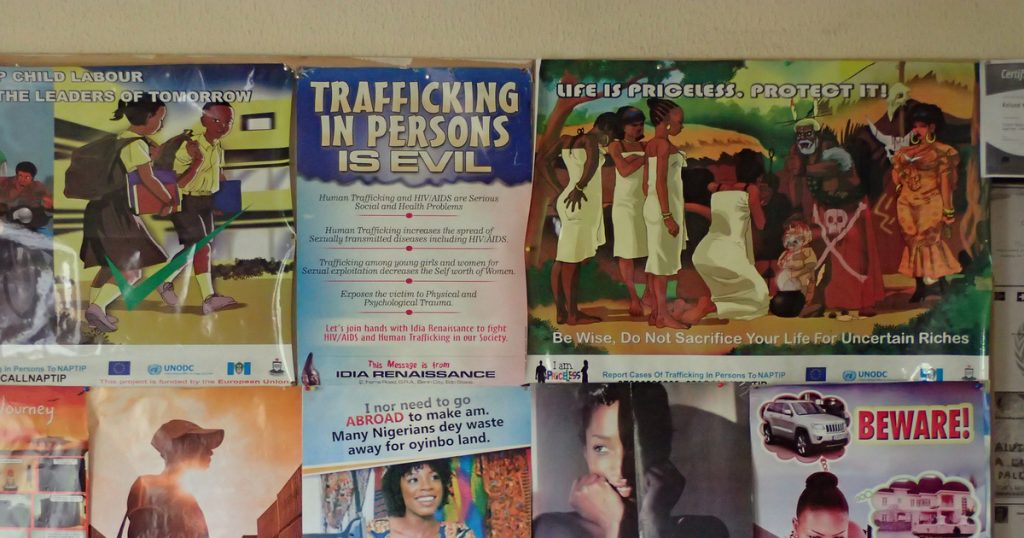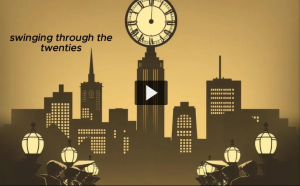Traditionally, when one imagines how someone ends up in slavery of any kind, one sees images of people being forcibly taken from their homes and sent to a foreign country, with absolutely no say in the matter. While this is usually the case in sexual slavery and for other kinds of bondage, it is no longer the case for women from Edo State in Nigeria, that provides 80% of women trafficked into Europe.1 Instead, there is a new phenomenon where women seek out passage to Europe through Madams, knowingly entering into prostitution. This was not always been the case, but extreme poverty, where some even lack running water, this practice has begun flourishing.2

Previously, recruiters lure women with tales of jobs in Europe, working for wealthy families, being hairdressers or nannies, only to find out the harsh reality of forced sex work once they arrived. Eventually, returning with embellished stories of wealth to tempt and recruit women themselves, completing the vicious cycle from victim to perpetrator. Some of the Madams even live in lavish houses, behind gates, as a testament of just what can be earned in European sex work. This show of wealth, in a desperate state, slowly began to transform just how women were recruited into the sex trafficking world.3
More recently, traffickers are being sought out by their victims in hope for a better life for themselves and their families.4 Little do they know of the harsh conditions and abuse they will endure before they can ever return home. After discussion of the “terms” of the work, the women sign legally binding contracts that say they will pay back rent, travel expenses, food, and other miscellaneous expenses, sometimes in a matter of months, sometimes in many years. These expenses total anywhere from 30,000 to 60,000 US dollars, on average. Usually, the women charge 5 to 10 US dollars per client, requiring them to work from sunup to sundown, and sometimes longer.5

Aside from relying on the signed contracts, Madams and pimps use the threat of violence against families, and religion, to keep the women from leaving.6 Using black magic referred to as JuJu, priests perform complex rituals that include eating raw chicken hearts, harm to oneself, drinking cocktails of their own fingernails, hair, and blood, as well as other methods, to bind the women with their traffickers. After completion of the rituals, they are made to feel that death, insanity, or harm will come to their families if they are to break their oath of repayment. A priest, who has benefited greatly from Madams and the pimps he has helped, stated in an interview that the purpose of these rituals are that “she never sleeps well or has peace of mind until she pays what she owes.”7

Furthermore, religion and belief in the negative effects that stem from the severance of the oaths have even led parents to become more complacent and insist that their daughters follow the requests of the people who are exploiting them.8 This, coupled with extreme poverty, exacerbate the growing phenomenon in Edo State, rendering it even more difficult to combat. Though, there are efforts to better the lives of women in Edo State. Education promotes agricultural development and other “basic needs industries,” and is central to the campaigns to inform about the horrors and negative effects of trafficking, and working toward the decriminalization, not legalization, of prostitution to help, instead of punish, those who have been ensnared in a vicious cycle of abuse which is making strides.9
New policies and rules are being implemented and promoted by grassroots organizations, and governments are taking notice. On November 15, 2000, the UN established a “Protocol to Prevent, Suppress and Punish Trafficking in Persons, Especially Women and Children, supplementing the United Nations Convention against Transnational Organized Crime,” which has 173 signatories, showing the world that these malum in se actions have become malum prohibitum or universally illegal, and punishable internaitonally.10 Even with all of these measures, and the recognition of this epidemic at an international level, there are still roughly 4.8 million people (19% of all humans trafficked) enslaved for sexual exploitation in the world, bringing in 99 billion dollars annually (66% of all profits from human trafficking).11 More must be done to end all forms of human trafficking, and it starts with a deeper understanding of the differing local and cultural patterns of recruitment throughout the world. Education and the provision of alternative work options remain the most powerful deterrents.
- Seema Kawar, From Benin City to the Shores of Italy: A New Hub of Human Trafficking, NAOC, (Accessed January 31, 2018), http://natoassociation.ca/from-benin-city-to-the-shores-of-italy-a-new-hub-of-human-trafficking/. ↵
- Abaobi Tricia Nwaubani, Cycle of exploitation turns Nigerian sex slaves in Italy into traffickers, News.trust.org, (Accessed February 12, 2018), http://news.trust.org/item/20161108000327-qfsaw/. ↵
- Abaobi Tricia Nwaubani, Cycle of exploitation turns Nigerian sex slaves in Italy into traffickers, News.trust.org, (Accessed February 12, 2018), http://news.trust.org/item/20161108000327-qfsaw/. ↵
- Abaobi Tricia Nwaubani, Cycle of exploitation turns Nigerian sex slaves in Italy into traffickers, News.trust.org, (Accessed February 12, 2018), http://news.trust.org/item/20161108000327-qfsaw/. ↵
- Esohe Aghatise, Iroko Onlus: Working to Combat the Trafficking of Nigerian Women and Girls Into Italy, Canadian Woman Studies 22, no. 3/4 (2003): 197-199, Humanities Full Text (H.W. Wilson), EBSCOhost (accessed January 31, 2018). ↵
- Esohe Aghatise, Iroko Onlus: Working to Combat the Trafficking of Nigerian Women and Girls Into Italy, Canadian Woman Studies 22, no. 3/4 (2003): 197-199, Humanities Full Text (H.W. Wilson), EBSCOhost (accessed January 31, 2018). ↵
- C. S. Baarda, Human trafficking for sexual exploitation from Nigeria into Western Europe: The role of voodoo rituals in the functioning of a criminal network, European Journal Of Criminology 13, no. 2 (2016): 257, Complementary Index, EBSCOhost (accessed January 31, 2018). ↵
- Abaobi Tricia Nwaubani, Cycle of exploitation turns Nigerian sex slaves in Italy into traffickers, News.trust.org, (Accessed February 12, 2018), http://news.trust.org/item/20161108000327-qfsaw/. ↵
- Esohe Aghatise, Iroko Onlus: Working to Combat the Trafficking of Nigerian Women and Girls Into Italy, Canadian Woman Studies 22, no. 3/4 (2003): 197-199, Humanities Full Text (H.W. Wilson), EBSCOhost (accessed January 31, 2018). ↵
- United Nations, Protocol to Prevent, Suppress and Punish Trafficking in Persons, Especially Women and Children, supplementing the United Nations Convention against Transnational Organized Crime, International Law & World Order: Westons & Carlsons Basic Documents, November 15, 2000, doi:10.1163/2211-4394_rwilwo_sim_033351. ↵
- Human Trafficking by the Numbers, Human Rights First, January 7, 2017. (Accessed February 12, 2018), https://www.humanrightsfirst.org/resource/human-trafficking-numbers. ↵


90 comments
Edgar Ramon
You never understand how little value some evil people place on lives until you read about it or experience it I guess. To think that there are people basically threatening these women constantly is just horrendous, and should be cracked down on. I honestly wonder if the state of Nigeria has done something to stop this trafficking. If not, if they perhaps don’t have the power, I am certain that there are organizations, certainly volunteers who are more than willing to help. However dangerous the job would be.
Samuel Stallcup
Our culture’s view of a pimp is quite interesting. People sometimes idolize and adore these people because of what they are able to accomplish, however they may not know the dark side of what is actually happening. Although many don’t see it this way, it is a form of human trafficking, and this article does a good job at explaining the concept. It also gave good examples, and the story itself was interesting to read about. Nice article!
Carlos Vazquez
Sex trafficking has affected hundreds of people from all over the world. It Incredibly sad that the women of Nigeria and other places from Africa are lied to in order to lure them into the world of sex trafficking. It is even worse to see that some people see this as the only way to be able to support a family. This article is really well written and informative, and I really enjoyed reading it.
Iris Henderson
I love that the author used the STMU History Media page as a platform to shine a light on such a terrible problem that is still affecting many lives today. It was heartbreaking to read how vulnerable and desperate Nigerian’s are being manipulated into the human trafficking life all because they have hopes for a better life. I truly hope that all of our nations can come together to find a solution for this problem that is worldwide and not just solely a Nigerian problem.
Michael Thomas
I found this article interesting because of how it details the sex trafficking in Nigeria. It is disappointing that women from countries like Nigeria are lured into sex trafficking with the illusions of jobs away from their countries. Yet, some of these women use this as a way to make money for their families. Overall, this article was well-written and informative.
Maricela Guerra
This is terrible, why would a country or any place allow this sort of thing. There shouldn’t be any more trafficking but of course these people are powerful. The way that these horrible people just take over young women and lure them into this terrible crime. These people have money, and services, which is why this cycle never stops. What more can we do now if this keeps happening?
Maria Esquivel
Reading this article was interesting. As the beginning states, I always thought human trafficking was individuals forcibly taking women and children but reading that many women in Edo State have to willingly enter slavery is horrible. It is saddening that many are forced to continue being sex slaves in order to protect and provide for their families, and the way they are threatened is just sickening. I am glad policies and rules are being created to change all forms of human trafficking. Great Job!
Belia Camarena
This article was very informative and well written. It is so sad to hear that even now in the twenty first century there are still forms of slavery. It is even worse to hear that people, such as the women in Nigeria, enter these forms of slavery willingly. No one should ever feel that the only way to move up or to build a better life is by selling themselves. This phenomena shows that we as a society need to work harder to educate provide meaningful jobs to everyone.
Regina De La Parra
It is very saddening to see the conditions that Nigerian woman live in, especially after the International Women’s Day which we commemorated recently. It is unbelievable that something that is so wrong gets to be accepted because of the “help” it might bring a community. Thank you for shedding light on such a hard topic accompanied by lots of information. Great job Natalie!
Rafael Lopez-Rodriguez
I really liked this article! This article reminded me of a documentary I saw about human trafficking in the Ivory Coast focused on the trafficking of children. It is very sad how women here had to be seen basically as “sex toys” to be able to provide to their families. It is great that the UN has established policies regarding this matter. Amazing article!